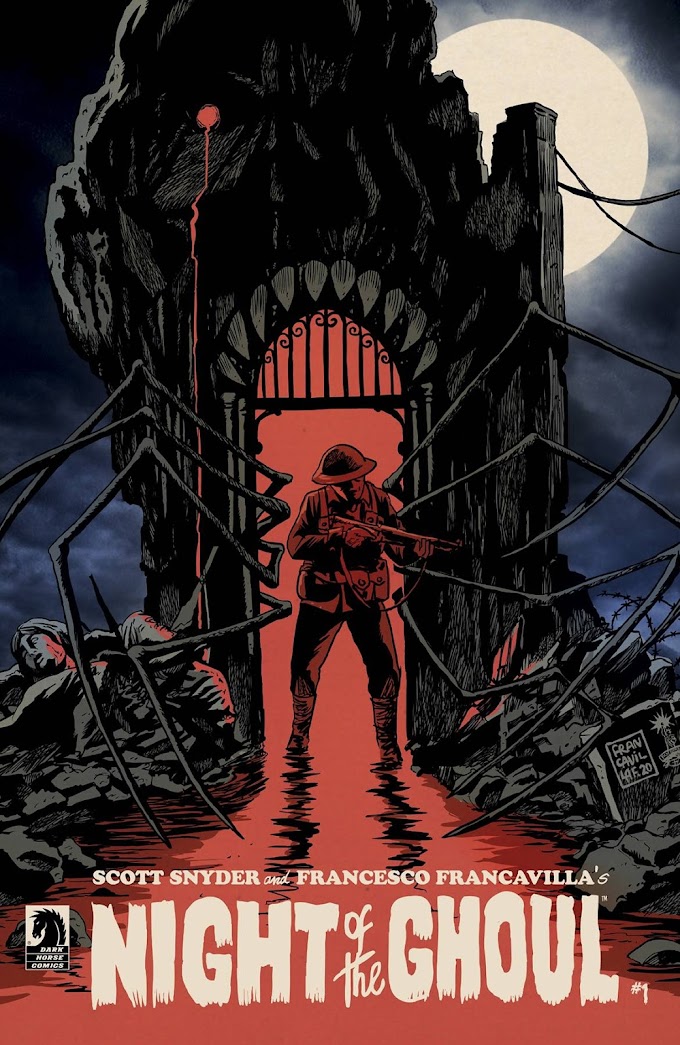Days Longer Than Long Pork Sausage
Written and Illustrated by Gabriel Corbera
Published by Space Case
In "DLTLPS" two muscle dudes navigate an endless castle traversing obstacles, fighting monsters, dying, and being reborn. Along the way they enjoy what small pleasures they may - like an errant beam of sunlight shining down from off panel, or some stale cigarettes foraged from a corpse. They hang onto shreds of human decency and take pride in work well done. And they ruminate on what is real and what it means to die if you are the last humans alive.
My primary reaction to how this looks is that it must have been a blast to draw. Nothing is really fussed over and liberties are taken with perspective, shading, and movement that are creative and unusual. At a few points there are thick straight motion lines drawn behind the two characters as they run across a room that look like solid black versions of the lines in the GI Joe logo.
Sometimes it’s not always obvious right away what you are looking at, like when they come up to a ditch and look at ropes that hang over the edge they will need to climb down. There is a long tradition in alternative comics of “traversing an environment” and of the reader having to slow down to study the details of what is being traversed to make sense of it. I remember staring at a train in a Yokoyama comic trying to determine which way it was actually moving. Similar to Yokoyama the ambiguity in the detail wrk of Corbera feels like a feature of the comic rather than a defect.
The look of the characters, their actions, the environment, and an epigraph from Zork all point to these characters unknowingly being inside a video game playing out their existential drama. Even the lettering is done with a computer font (specifically it looks like Helvetica) which both works with the get-the-page-done-and-move-on art style as well as reinforces the artificiality of the computer game conceit. Unlike Zork, these characters are primarily interested in survival and escape rather than adventure and treasure - but this plays right into the overarching irony of the whole book: Since they exist in a game their life is not what they make of it. They are not, as Satre says "responsible for their world", and it is a self-deception for them to presume this. Their actions and their world are defined completely by the game developers and the person playing the game.
The characters in "DLTLPS" face up to their own deaths with equanimity, but we know it to be a farce. It's the privilege of being the reader--understanding that which the character cannot know but the creator wants us to see. Corbera does this well, making for interesting reading.
You can buy DLTLPS directly from Space Case here.
Written and Illustrated by Gabriel Corbera
Published by Space Case
In "DLTLPS" two muscle dudes navigate an endless castle traversing obstacles, fighting monsters, dying, and being reborn. Along the way they enjoy what small pleasures they may - like an errant beam of sunlight shining down from off panel, or some stale cigarettes foraged from a corpse. They hang onto shreds of human decency and take pride in work well done. And they ruminate on what is real and what it means to die if you are the last humans alive.
My primary reaction to how this looks is that it must have been a blast to draw. Nothing is really fussed over and liberties are taken with perspective, shading, and movement that are creative and unusual. At a few points there are thick straight motion lines drawn behind the two characters as they run across a room that look like solid black versions of the lines in the GI Joe logo.
Sometimes it’s not always obvious right away what you are looking at, like when they come up to a ditch and look at ropes that hang over the edge they will need to climb down. There is a long tradition in alternative comics of “traversing an environment” and of the reader having to slow down to study the details of what is being traversed to make sense of it. I remember staring at a train in a Yokoyama comic trying to determine which way it was actually moving. Similar to Yokoyama the ambiguity in the detail wrk of Corbera feels like a feature of the comic rather than a defect.
The look of the characters, their actions, the environment, and an epigraph from Zork all point to these characters unknowingly being inside a video game playing out their existential drama. Even the lettering is done with a computer font (specifically it looks like Helvetica) which both works with the get-the-page-done-and-move-on art style as well as reinforces the artificiality of the computer game conceit. Unlike Zork, these characters are primarily interested in survival and escape rather than adventure and treasure - but this plays right into the overarching irony of the whole book: Since they exist in a game their life is not what they make of it. They are not, as Satre says "responsible for their world", and it is a self-deception for them to presume this. Their actions and their world are defined completely by the game developers and the person playing the game.
The characters in "DLTLPS" face up to their own deaths with equanimity, but we know it to be a farce. It's the privilege of being the reader--understanding that which the character cannot know but the creator wants us to see. Corbera does this well, making for interesting reading.
You can buy DLTLPS directly from Space Case here.






![Sweat and Soap [Ase to Sekken] by Kintetsu Yamada](https://blogger.googleusercontent.com/img/b/R29vZ2xl/AVvXsEgMnQltxjWqGS1_duhCp9Er1a0NbALuSFrqvjaV4_PjN_w67xCGghYt-l0qKyqTH7Ei7gbq_mxVq8aPAuOiyaArwAMLJWhpGmOYaARUBnwvjmv2-ZIe20m_zR5CvKnPdI6US_AuOnmi3gSX/w680/57525895-BA7E-4EF8-9FE4-89F9C164E1A4.jpeg)

